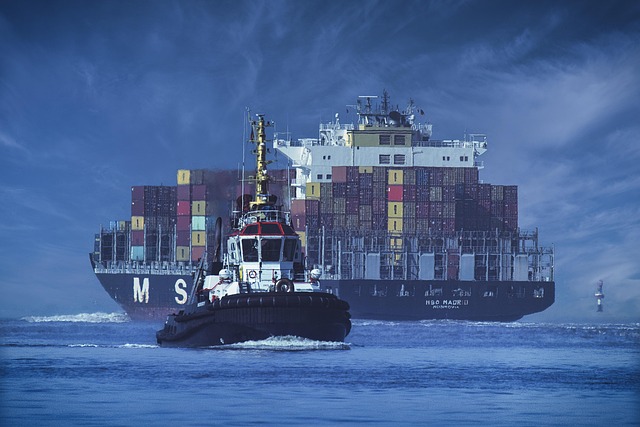
Image by Peter Lindenau from Pixabay
What looks, acts, and taxes like One World Government?
The UN has succeeded in getting a global shipping tax approved supposedly to control the weather. It will be formally adopted in October, and start in 2027, applying to ships of more than 5,000 tons. I don’t remember our parliamentarians debating it, do you? Somehow a tariff is a terrible thing, but a global trade tax paid to unaccountable bureaucrats will save the world?
It sets a very dangerous new precedent. For the first time the United Nations would be able to tax the world directly, without twisting the arm of national governments. Who owns the oceans? The UN apparently…
By 2030 the UN is projected to collect $40 billion in total from this tax. Supposedly they will hand this on to “supporting developing countries” (like China, eh?). Obviously this give the UN bureaucrats another $40 billion in power. It’s more money for them to fly to conferences in the Amazon, more money to reward their “friends”, and more money to buy the right votes at the right moment. It will feed more committees to write more press releases to shake down even more money from the hapless taxpayers of the West.
And why would it stop there? Once the UN can collect the cash from ships, why not planes too, and surely satellites and rockets? (Has anyone told Elon?)
Whatever happened to “No taxation without political representation?” Killed by a thousands cuts.
Global breakthrough to tackle shipping emissions
Esme Stallard, BBC
Countries have agreed a global deal to tackle shipping emissions, after nearly ten years of negotiations. The agreement covers the vast majority of the world’s commercial shipping and means that starting in 2028, ship owners will have to use increasingly cleaner fuels or face fines. The deal was nearly derailed after Saudi Arabia forced a last minute vote and the US pulled out of talks in London – but it eventually passed on Friday. Small island states and environmental groups were angry that a blanket tax was not agreed to and called the deal “unfit for purpose”.
The United Nations’ International Maritime Organization (IMO) will be able to take $380 per ton of “carbon” emitted.
It will require owners of large international vessels to increase their use of less carbon intensive fuels or face a penalty of up to $380 per tonne of carbon dioxide emissions they emit from burning fuel.
The vote was requested by Saudi Arabia, who did not support the agreement, and this position was shared by a dozen other oil-producing nations, including Russia.
Although they opposed the proposal, they will be bound to implement it because they are members of the IMO.
The targets are impossible but that’s a feature, not a bug
The UN decided the world’s shipping will reach Net Zero in 2050, as if we will all learn to sail or use solar powered ships. But the UN surely knows the targets are wildly unreasonable, and that’s the point. Ships that don’t manage to convert to hydrogen or ammonia, or run on palm oil or fairy dust, will be able to “pay more” to the UN instead.
The great thing about impossible targets is they make for endless cash cows for fat parasites to dine out on:
Figures vary depending on the fuel type but the World Economic Forum estimates that these green fuels are 3-4 times more expensive to produce.
“There is no fuel as cheap as diesel that ships use today because when we take crude oil out of the ground, we take out all the nice bits, that’s the kerosene for aviation, diesel and petrol for cars,” said Faig Abbasov, programme director for maritime transport at think tank Transport and Environment.
“Whatever is left at the bottom, that’s what ships burn. So no fuel will be as cheap as this because not much energy goes into its production,” he said.
It is estimated that the agreement could achieve an 8% reduction in emissions for the sector by 2030, according to the maritime consultancy UMAS.
So they will use $40 billion to cut 8% off 3% of the human global emissions by 2030 — cutting mankind’s whole output by 0.25%, an amount too small to measure, but employing a lot of UN people to do it. And the money will go help the poor starving NGO’s who ran out of USAID money, right?
Any money raised from the penalties will be put into a “Net Zero” fund, with money spent on scaling up greener fuels and supporting developing countries.
It is this “redistribution” that prompted the US delegation to pull out of the talks on Tuesday night. A letter was sent by the US to all countries at the IMO negotiations saying any levy would cause inflation and if it was passed then “reciprocal measures” would be taken.
The deal was nearly derailed after Saudi Arabia forced a last minute vote and the US pulled out of talks in London – but it eventually passed on Friday.
The US delegation left the proceedings, but apparently that doesn’t matter because they don’t have many boats (can we get an exemption too?)
The US only flags 178 cargo ships that represent 0.57% of worldwide commercial shipping tonnage.
Once it starts it will never end. If the UN could raise the tax because they felt like it, what would stop them? Nothing — until the big trading nations get fed up, and either pull out of the UN or send in the aircraft carriers.
More than ever, we need an alliance in the Anglosphere that just says “No”. End the UN. It has failed at the only tasks it was set up to do — stop wars and end pandemics.
H/t David E